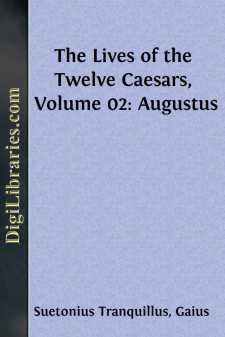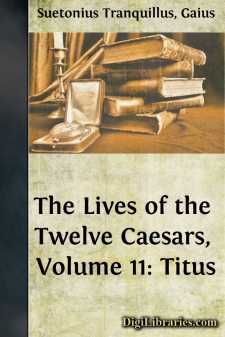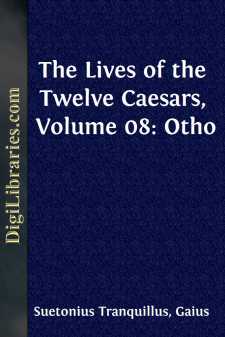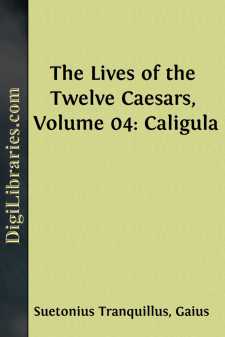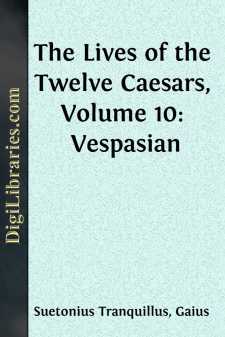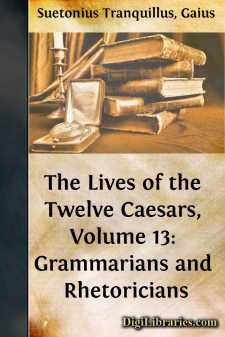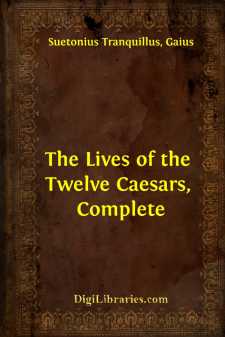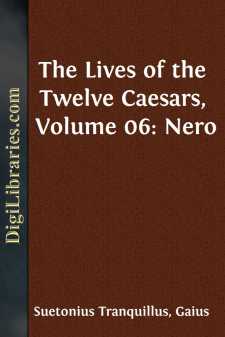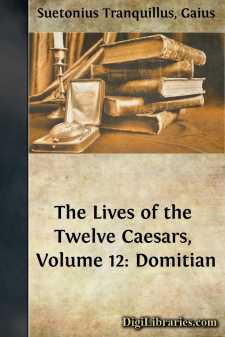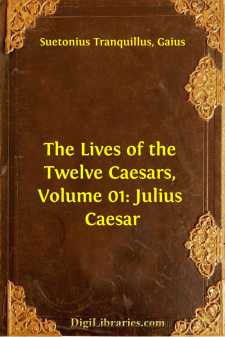Categories
- Antiques & Collectibles 13
- Architecture 36
- Art 48
- Bibles 22
- Biography & Autobiography 813
- Body, Mind & Spirit 142
- Business & Economics 28
- Children's Books 17
- Children's Fiction 14
- Computers 4
- Cooking 94
- Crafts & Hobbies 4
- Drama 346
- Education 46
- Family & Relationships 57
- Fiction 11829
- Games 19
- Gardening 17
- Health & Fitness 34
- History 1377
- House & Home 1
- Humor 147
- Juvenile Fiction 1873
- Juvenile Nonfiction 202
- Language Arts & Disciplines 88
- Law 16
- Literary Collections 686
- Literary Criticism 179
- Mathematics 13
- Medical 41
- Music 40
- Nature 179
- Non-Classifiable 1768
- Performing Arts 7
- Periodicals 1453
- Philosophy 64
- Photography 2
- Poetry 896
- Political Science 203
- Psychology 42
- Reference 154
- Religion 513
- Science 126
- Self-Help 84
- Social Science 81
- Sports & Recreation 34
- Study Aids 3
- Technology & Engineering 59
- Transportation 23
- Travel 463
- True Crime 29
The Lives of the Twelve Caesars, Volume 02: Augustus
Description:
Excerpt
I. That the family of the Octavii was of the first distinction in Velitrae [106], is rendered evident by many circumstances. For in the most frequented part of the town, there was, not long since, a street named the Octavian; and an altar was to be seen, consecrated to one Octavius, who being chosen general in a war with some neighbouring people, the enemy making a sudden attack, while he was sacrificing to Mars, he immediately snatched the entrails of the victim from off the fire, and offered them half raw upon the altar; after which, marching out to battle, he returned victorious. This incident gave rise to a law, by which it was enacted, that in all future times the entrails should be offered to Mars in the same manner; and the rest of the victim be carried to the Octavii.
II. This family, as well as several in Rome, was admitted into the senate by Tarquinius Priscus, and soon afterwards placed by Servius Tullius among the patricians; but in process of time it transferred itself to the plebeian order, and, after the lapse of a long interval, was restored by Julius Caesar to the rank of patricians. The first person of the family raised by the suffrages of the people to the magistracy, was Caius Rufus. He obtained the quaestorship, and had two sons, Cneius and Caius; from whom are descended the two branches of the Octavian family, which have had very different fortunes. For Cneius, and his descendants in uninterrupted succession, held all the highest offices of the state; whilst Caius and his posterity, whether from their circumstances or their choice, remained in the equestrian order until the father of Augustus. The great-grandfather of Augustus served as a military tribune in the second Punic war in Sicily, under the command of Aemilius Pappus. His grandfather contented himself with bearing the public offices of his own municipality, and grew old in the tranquil enjoyment of an ample patrimony. Such is the account given (72) by different authors. Augustus himself, however, tells us nothing more than that he was descended of an equestrian family, both ancient and rich, of which his father was the first who obtained the rank of senator. Mark Antony upbraidingly tells him that his great-grandfather was a freedman of the territory of Thurium [107], and a rope-maker, and his grandfather a usurer. This is all the information I have any where met with, respecting the ancestors of Augustus by the father's side.
III. His father Caius Octavius was, from his earliest years, a person both of opulence and distinction: for which reason I am surprised at those who say that he was a money-dealer [108], and was employed in scattering bribes, and canvassing for the candidates at elections, in the Campus Martius. For being bred up in all the affluence of a great estate, he attained with ease to honourable posts, and discharged the duties of them with much distinction. After his praetorship, he obtained by lot the province of Macedonia; in his way to which he cut off some banditti, the relics of the armies of Spartacus and Catiline, who had possessed themselves of the territory of Thurium; having received from the senate an extraordinary commission for that purpose. In his government of the province, he conducted himself with equal justice and resolution; for he defeated the Bessians and Thracians in a great battle, and treated the allies of the republic in such a manner, that there are extant letters from M. Tullius Cicero, in which he advises and exhorts his brother Quintus, who then held the proconsulship of Asia with no great reputation, to imitate the example of his neighbour Octavius, in gaining the affections of the allies of Rome.
IV. After quitting Macedonia, before he could declare himself a candidate for the consulship, he died suddenly, leaving behind him a daughter, the elder Octavia, by Ancharia; and another daughter, Octavia the younger, as well as Augustus, by Atia, who was the daughter of Marcus Atius Balbus, and Julia, sister to Caius Julius Caesar....


